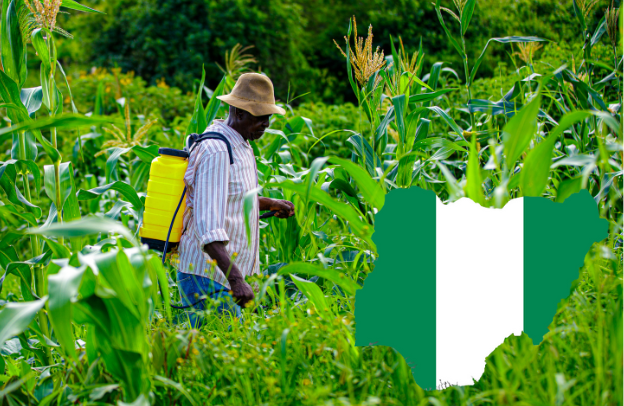The Nigerian Agricultural and Agribusiness Potential: Unlocking Opportunities for the African Diaspora

Imagine a continent endowed with vast arable lands and a youthful, energetic population. Yet, despite these advantages, food insecurity remains a persistent challenge in many regions of Africa. As a member of the African diaspora, you might wonder: How can I contribute to transforming Africa’s agricultural landscape? Is there a way to leverage my resources and expertise to foster economic growth and ensure food security? The answer lies in a humble yet powerful crop: cassava.
Take your Business Storytelling to the next level through our Story To Asset Transformation Framework.
Cassava’s Pivotal Role in Africa’s Agriculture
Cassava is more than just a staple food; it is a pillar of food security for millions across Sub-Saharan Africa. In Nigeria, the world’s largest producer, cassava is deeply woven into both daily diets and the economy. Beyond its role as a food source, it serves as a critical raw material in various industries, including flour, starch, ethanol, biofuels, and animal feed production. This versatility makes cassava a key driver of economic transformation.
According to the Food and Agriculture Organization of the United Nations (FAO), Nigeria’s cassava production in 2002 was estimated at approximately 34 million tonnes. Data from the Central Bank of Nigeria mirrored FAO reports until 1996, after which production surged, reaching 37 million tonnes in 2000 (FMANR, 1997; Central Bank of Nigeria).
However, the Presidential Cassava Initiative (PCU, 2003) provided a more conservative estimate, placing production at 28 million tonnes in 2002. The PCU figures were based on state-level data collected from Agricultural Development Program (ADP) offices nationwide.
See also Processing and Marketing of Selected Cassava Products in South-east Nigeria
Among staple crops in Nigeria, cassava leads in production volume, surpassing yam at 27 million tonnes in 2002, followed by sorghum (7 million tonnes), millet (6 million tonnes), and rice (5 million tonnes), according to The Food and Agriculture Organization of the United Nations (FAO, 2004a).
Cassava production has shown steady growth since 1980, with a notable boost between 1988 and 1992 due to the introduction of improved varieties developed by the International Institute of Tropical Agriculture (IITA). Regional production data from 1999 to 2002 indicate that the North Central zone led in output, producing over 7 million tonnes annually.
The South-South region followed with over 6 million tonnes per year, while the South-West and South-East zones each produced just under 6 million tonnes annually.
Yet, despite its vast potential, Nigeria has struggled to fully capitalize on cassava’s economic opportunities. Post-harvest losses, poor infrastructure, and limited value addition continue to hinder its impact. With the right investments in processing, storage, and market linkages, cassava could become a major force in agribusiness growth, rural employment, and national food security.
See also: The Cultural and Economic Significance of Cassava in Nigeria
Challenges Hindering Cassava Production
Cassava production, a crucial staple crop, is plagued by a range of challenges that prevent it from reaching its full potential. Among the most pressing issues is the inconsistent and unreliable supply of high-quality cassava cuttings and planting materials. This shortage leads to variations in seed quality, resulting in poor crop performance and increasing the risk of pests and diseases infiltrating the plantation.
Despite its critical importance, cassava production continues to struggle under multiple constraints that limit its ability to thrive:
- Low Productivity and Yield Gaps
The average cassava yield in Nigeria stands at a mere 10 tons per hectare—far from the potential of 40 tons per hectare, as highlighted by the FAO (2023). This significant yield gap is largely due to poor soil fertility, outdated farming practices, and limited access to modern agricultural inputs. As a result, farmers are unable to fully capitalize on the crop’s potential. - Pest and Disease Infestations
Cassava is vulnerable to destructive pests and diseases, such as Cassava Mosaic Disease and Cassava Brown Streak Disease, which can decimate yields by up to 70%. Unfortunately, many farmers lack access to disease-resistant cassava varieties and are ill-equipped with the knowledge and resources to implement effective pest management strategies, leaving their crops highly susceptible to damage. - Limited Access to Quality Inputs and Credit
Smallholder farmers in Sub-Saharan Africa (SSA) face considerable barriers in obtaining improved cassava varieties, fertilizers, and mechanization tools. This lack of access not only limits their productivity but also stifles their economic growth and hampers their ability to invest in the long-term sustainability of their operations.
These challenges present significant obstacles to maximizing cassava’s potential, highlighting the urgent need for comprehensive solutions that address supply chain issues, improve access to quality inputs, and support farmers with modern tools and knowledge
According to the World Bank, SSA is an incredibly diverse region, encompassing low-, lower-middle-, upper-middle-, and high-income countries. It includes 22 nations classified as fragile or conflict-affected and 13 small states with constrained land, limited human capital, and small populations.
Despite these hurdles, the region is rich in natural resources and home to the world’s largest free trade area, offering a vast 1.2-billion-person market. With the right policies and investments, Africa has the potential to unlock sustainable development by harnessing its natural wealth and human capital.
The region’s latest economic update projects growth to rise from 2.4% in 2023 to 3% in 2024, with further acceleration to 4% in 2025–26. However, persistent conflicts and rising violence continue to stifle economic activity, while climate shocks threaten to deepen vulnerabilities.
As of 2024, an estimated 464 million people in SSA still live in extreme poverty. Additionally, the region faces mounting debt distress, with 53% of IDA-eligible countries at significant risk or already in crisis.
See also Nigerian Cassava Production: How to Transform a Staple Crop into Africa’s Economic Powerhouse
Growth remains uneven across the continent. East Africa is expected to see modest improvement, with growth rising from 1.7% in 2023 to 2.2% in 2024, while West Africa is projected to expand from 3.3% to 3.9% over the same period.
However, SSA’s overall economic performance continues to lag, largely due to sluggish growth in its largest economies. In South Africa, energy and transportation bottlenecks hinder industrial progress, while Nigeria’s economy remains constrained by persistent challenges in its oil sector.
Meanwhile, political instability—driven by conflicts and military coups in Sudan, Niger, and Gabon—poses a threat to economic stability in the Economic and Monetary Community of Central Africa and parts of the Sahel.
Unlocking Africa’s agricultural potential, particularly through smallholder farmers, will be key to sustainable economic growth. Investments in improved agricultural inputs, infrastructure, and value-added processing could drive food security, rural employment, and overall economic resilience.
See also: Harvesting and Storing Cassava: Tips for Nigerian Farmers
Strategic Solutions for Enhancing Cassava Production
Addressing these challenges requires a multifaceted approach:
1. Adoption of Improved Farming Techniques
Investing in high-yielding, disease-resistant cassava varieties can significantly boost productivity. Organizations like the International Institute of Tropical Agriculture (IITA) have developed improved cassava breeds with higher starch content and better resistance to diseases.
Training farmers in modern agricultural practices, such as proper spacing, timely planting, and efficient weed control, can further enhance yields.
2. Integrated Pest and Disease Management
Implementing integrated pest management strategies, including crop rotation, biological control agents, and the use of resistant varieties, can mitigate the impact of pests and diseases. Establishing community-based disease monitoring and early warning systems can also help in timely intervention.
3. Enhancing Access to Inputs and Financial Support
Developing input credit schemes and strengthening agricultural cooperatives can facilitate farmers’ access to necessary resources. Microfinance institutions tailored to the needs of smallholder farmers can provide the financial support required for investing in improved seeds, fertilizers, and mechanization.
See also: The Economic Value of Cassava Farming in Nigeria: Opportunities and Challenges
The Role of the African Diaspora in Transforming Cassava Agribusiness
As a member of the African diaspora, you possess unique resources and perspectives that can drive change in Nigeria’s cassava sector:
Investment in Agribusiness Ventures
IFAD Underscores the Transformative Power of Remittances at Global Climate Summit
Riyadh, Saudi Arabia/Rome, Italy – December 4, 2024 – As climate experts gather in Riyadh for the final global climate summit of the year, the United Nations’ International Fund for Agricultural Development (IFAD) has unveiled two groundbreaking reports highlighting the vital role of remittances—funds sent home by migrant workers—in fostering sustainable development.
“These funds are more than just financial transfers,” said Pedro de Vasconcelos, Manager of IFAD’s Financial Facility for Remittances. Discussing the reports, developed in collaboration with the UN Convention to Combat Desertification (UNCCD), he emphasized how remittances empower migrant families to enhance food security, diversify incomes, and adopt climate-smart agricultural practices such as drought-resistant crops and agroforestry.
Remittances now surpass both Foreign Direct Investment (FDI) and official development assistance, representing a crucial financial lifeline for rural communities. By channeling even a fraction of these funds into cassava agribusinesses, countries can modernize farming practices, strengthen food systems, and boost exports—unlocking new economic opportunities while enhancing climate resilience.
Knowledge and Technology Transfer
Diaspora members can facilitate the transfer of modern agricultural technologies and best practices to local farmers. This includes introducing innovative farming techniques, promoting sustainable practices, and providing training on the use of advanced agricultural equipment.
Advocacy and Policy Engagement
Engaging with policymakers to advocate for supportive agricultural policies can create an enabling environment for cassava production and processing businesses. The diaspora can also participate in agricultural trade forums and investment summits to drive policy changes that benefit agribusiness entrepreneurs.
Building a Sustainable Future: How You Can Get Involved
The transformation of Nigeria’s cassava industry requires collaborative efforts. Here’s how you can contribute:
Invest in agribusiness startups focused on cassava processing, packaging, and export.
Partner with local farmers by providing funding, training, and market access.
Advocate for agribusiness-friendly policies in both Nigeria and your country of residence. Leverage technology to bridge gaps in:
- Information,
- Financing,
- And logistics.
See also: Maximizing Cassava Yield: Fertilizer Application Strategies for Small-Scale Farmers in Nigeria
Conclusion: The Time to Act is Now
Nigeria’s agricultural and agribusiness potential remains largely untapped. With vast land resources, an expanding population, and increasing global demand for cassava-based products. The sector offers immense opportunities for economic growth, job creation, and food security.
As a member of the African diaspora, you are uniquely positioned to drive this transformation. Whether through investment, technology transfer, or policy advocacy, your involvement can make a lasting impact. The time to act is now Africa’s agricultural future depends on it.
Take your Business Storytelling to the next level through our Story To Asset Transformation Framework.




